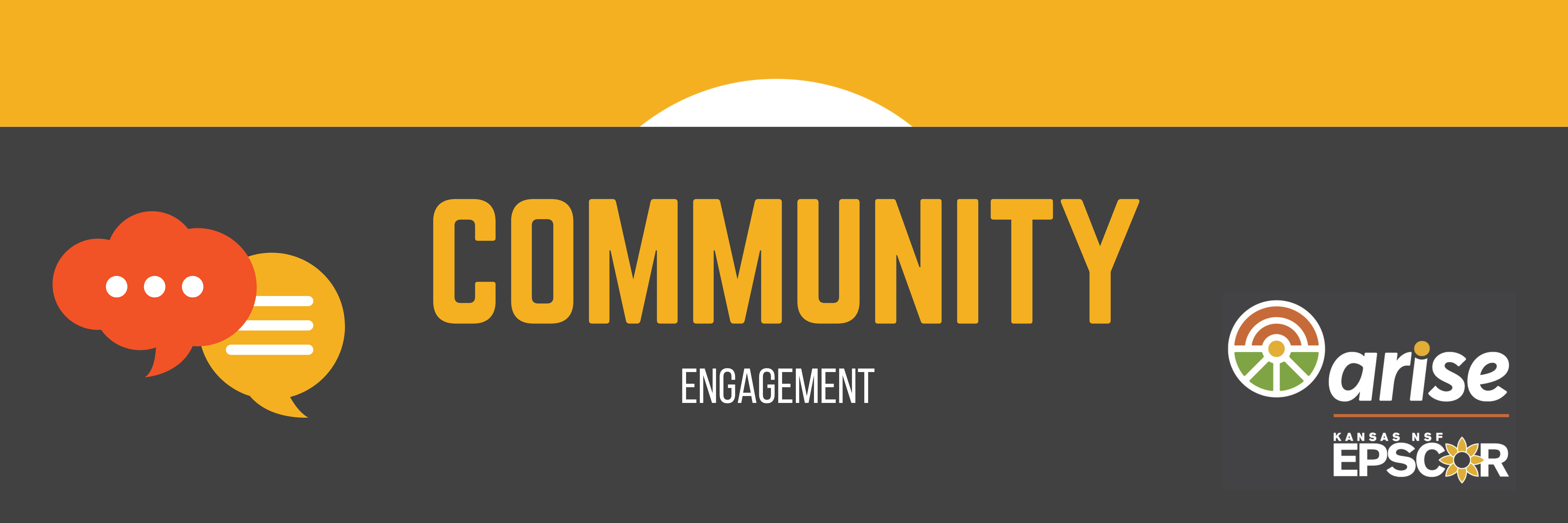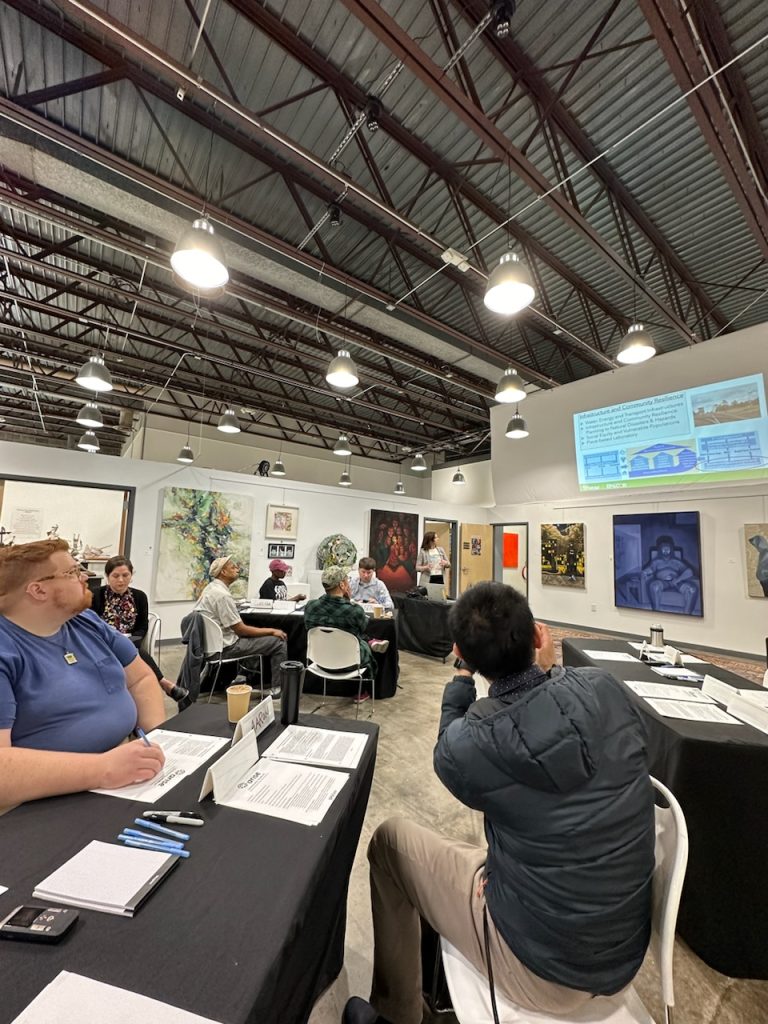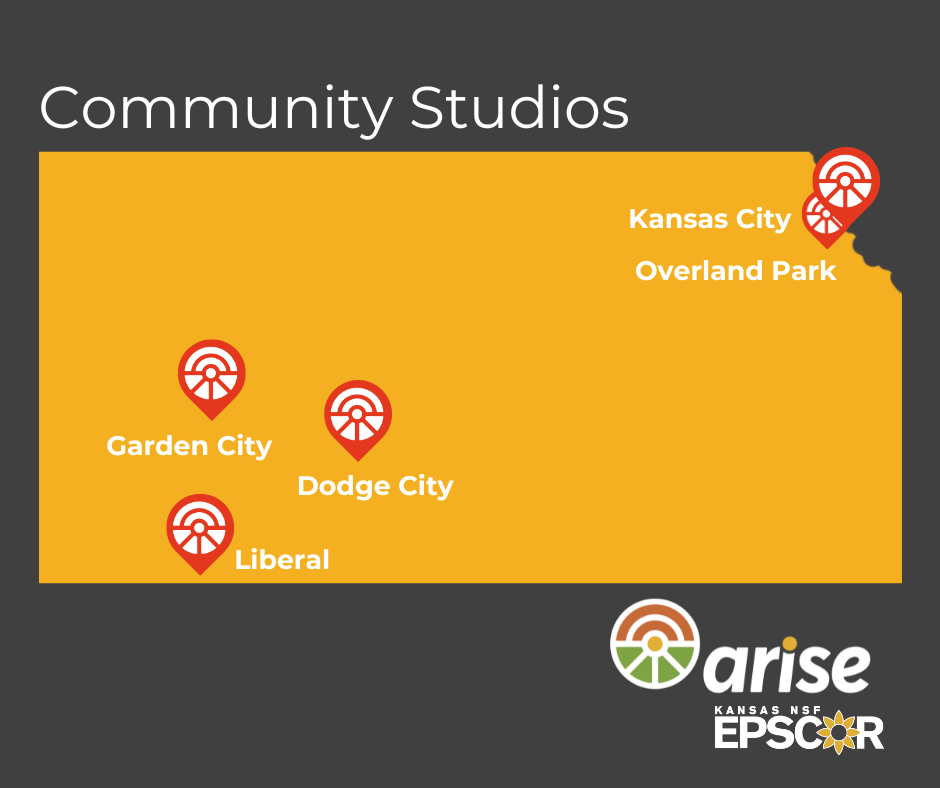
It is rare for everyday folks to talk to academics about real-world challenges. But a research team known as ARISE seeks out these types of conversations.
From February to June 2024, the team hosted eight community studios in five cities. Roughly 85 Kansans attended these events alongside 20 in-state scientists to share stories about disaster resilience and how equity impacts infrastructure investments in their communities.
“We go out to engage communities in our research because they have local knowledge that we don’t have,” said Jason Bergtold, professor of agricultural conomics at Kansas State University.
The reason for this engagement is straightforward: it takes more than technical know-how to solve major societal challenges like safeguarding communities against extreme weather disasters. Knowing about people’s lived experiences is vital, especially given vast differences in urban and rural life.
“Without these critical connections, our research would likely fall short in meeting local needs,” Dr. Bergtold said.
To nurture these connections, Dr. Bergtold teamed up with two leaders of the Environmental Finance Center at Wichita State University, Director Tonya Bronleewe and Program Associate John Colclazier. They facilitated a series of eight community studios (so far!) with the help of Alej Martinez, program coordinator at the University of Kansas.
“Each studio follows an established framework that encourages culturally sensitive conversations meant to benefit both the communities and the researchers,” Dr. Bergtold said.
An array of folks from Dodge City, Garden City, Liberal, Kansas City, and Overland Park attended the studios. A complementary lunch and $100 cash helped incentivize participation for the three-and-half hours long meetings.
Attendees at each studio were diverse in experiences, ages, cultures, jobs, and languages. To ensure a wide breadth of perspectives was welcome, two studios were also offered in Spanish.
Researchers from K-State, WSU, and KU attended as well, bringing expertise in fields such as engineering, computer science, psychology, and economics. One of those was Justin Hutchison, KU assistant professor of civil, environmental and architectural engineering, who co-leads theme 3 research on drinking water for the ARISE project.
“It was a unique opportunity to hear so many interesting stories of Kansans from many different aspects of life,” Dr. Hutchison said.
Each studio started off by exploring the definition of resilience, which means having the capacity to prepare for, withstand, and recover from disruptions like floods and tornadoes. Then participants looked at equity and took surveys to tease out which aspects they think matter most for bolstering resilience and equity in their town.
For example, a Western Kansas community ranked effective leadership and reliable access to infrastructure services among its top aspects for resilience. They also ranked equal access to clean water among its top aspects for equity.
Attendees also gathered in small groups at the studios to swap stories about instances when folks came together to tackle a challenge. As they shared countless ways their neighbors, businesses, and organizations interact to improve livelihoods, the conversations were recorded for analysis by Dr. Bergtold’s team.
“I heard incredible stories of how communities came together to help each other during extreme weather events,” Alej Martinez said. “We need to uplift those stories and learn from them.”
At the end of each studio, attendees did an activity to identify community capitals—those top assets that are the lifeblood of their town. Assets fall into seven categories: natural, built, cultural, social, financial, human, and political. Think farms and festivals, parks and paved roads, churches and charities, leaders and skilled laborers, and much more.
“Knowing a community’s key assets and resources sets the stage for us to think about how to build on those assets and resources to meet the needs of the future,” Dr. Bergtold said.
Funding for the Community Studios comes from the ARISE project, a five-year, $20 million dollar investment in Kansas by the U.S. National Science Foundation Established Program to Stimulate Competitive Research (NSF EPSCoR) and the Kansas Board of Regents. The ARISE acronym stands for “Adaptive and Resilient Infrastructures driven by Social Equity.”
Dr. Bergtold’s team plans to host a second round of community studios soon to continue to share stories and develop ways to measure resilience. To join the conversation, contact the Kansas NSF EPSCoR office at nsfepscor@ku.edu.

This spring, dozens of Kansas residents and researchers met to do something remarkable: talk to each other.

At eight ‘community studios,’ an array of folks from Dodge City, Garden City, Liberal, Kansas City, and Overland Park swapped stories with K-State, KU, and WSU researchers.
